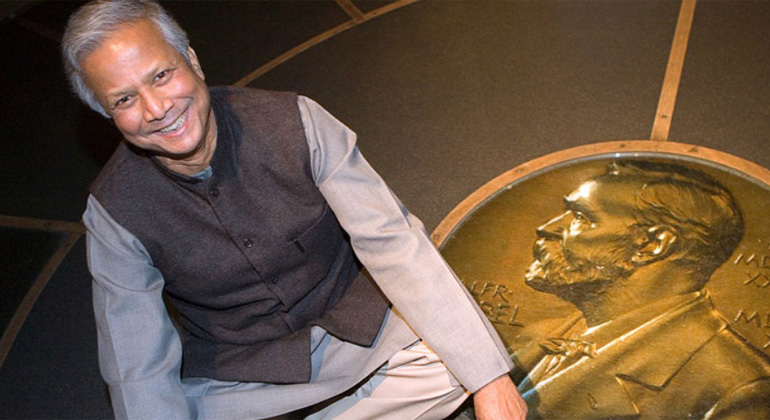Eco-social problem solving as the new economic miracle. By Peter Spiegel
“Whenever I see a problem, I start a company to solve it.” This is how the Nobel Peace Prize winner Muhammad Yunus once its business model. Is this social romanticism or the basic formula for a new generation of economic miracles, perhaps even a world economic miracle? The “wealth” of global ecological, social, societal and other problems is certainly large enough for that. But the wealth of ideas for solutions?
At its core, the economy lives from ideas and solutions. Nothing new so far. But problems such as widespread and massive poverty or a radical ecological turnaround or a fundamental revolution in the health care system – aren’t these more of a state task?
His business model for the incredibly effective overcoming of poverty became known worldwide when he was awarded the Nobel Peace Prize in 2006. To tackle this problem, he founded a bank that only gave loans to the very poorest. They had no material collateral. Other factors provided security for the business model. Firstly, he formed teams of five, each of whom could only receive loans individually if they acted as guarantors for one another. This meant that they became amazingly effective advisors for one another. Secondly, they quickly learned that women are the more far-sighted and responsible borrowers and investors – and therefore the more reliable repayers. Thirdly, the Grameen Bank was firmly convinced, and thus convinced even the poorest, that they had entrepreneurial skills if they managed to support their families with almost nothing despite all their problems. The small loans were therefore in the best hands and the most effective way to free themselves from external control and exploitation. With this business model, Yunus single-handedly led the Grameen Bank to finally lift the poorest quarter of Bangladesh’s population out of the cycle of poverty – and even made them co-owners and co-determinants of future investments in his cooperative bank.
Far less well known is the very broad field of other revolutionary business models.
Who has noticed that Bangladesh has been the country that has installed by far the most solar roofs for more than a decade? And that without any state subsidies. The business model: Yunus calculated how long it would take if poor families – he started with them here too – paid off the loan for the solar system every month as much as they had previously spent on using the dirtiest form of energy. The result: With this repayment approach, the system was paid off after three years – after that they got free energy for at least five years, which is how long it lasted on average. Grameen Shakti, Yunus’s renewable energy company, then trained women in the intelligent maintenance of the systems, so that this eco-miracle lasted much longer and created space for further sustainability investments. An example and model with the potential to become a real global eco-transition miracle.
Who noticed that Grameen’s business model brought quantum leaps in improving rural healthcare while revolutionizing costs?
Who has noticed that Grameen Telecom provided the model for how, after its exemplary success, telecommunications companies sprang up all over the world in countries that had long been considered developing countries, thereby making a significant contribution to their development? Grameen Telecom is, by the way, the largest company in Bangladesh. There are many more success stories to tell about business models of this new kind that not only brought about economic miracles, but also and simultaneously powerful ecological miracles, social miracles, health miracles, and even educational miracles.
Now we all saw what happened in Bangladesh between August 5 and 8. The military in Bangladesh deposed the long-serving Prime Minister Sheikh Hasina, who ruled with brutal power. They put her in a helicopter and took her out of the country. Just three days later, the world was rubbing its eyes when Hasina’s favorite hate object, Nobel Peace Prize winner Muhammad Yunus, was sworn in as interim successor as Prime Minister with broad consensus from civil society, including the leadership of the student protests.
But we would be thinking too narrowly if we only asked ourselves what this means and can mean for Bangladesh. Muhammad Yunus, whom Business Week called “one of the five greatest entrepreneurs of all time”, was always far too cosmopolitan in his thinking and actions for that. He ensured that thousands of so-called “social businesses” were created all over the world.
The successful politician and successful business leader Lothar Späth recognized the real value of his innovative thinking and his exemplary implementation pilots as early as 1997, when he gave the laudation for the awarding of the “Planetary Consciousness Award” to Muhammad Yunus in the Paulskirche in Frankfurt: “This is the entry into the global eco-social market economy,” was his summary. He recognized the tremendous potential of overcoming the classic separation between “social” and “business” and solving social and ecosystem problems through a fundamentally new type of “business”, of “social business”. This can also lead to a fundamentally new type of economic miracle. and a fundamentally new kind of social miracle will emerge. And the change of government in Bangladesh will now take this to a new level. The exciting question has now become very real: What happens if politics can also be redefined so that suitable framework conditions for “social business” are developed and established?
Those
Peter Spiegel is a futurologist, director of the WeQ Institute and, since May 2024, chairman of the board of the non-profit Vereins „Friends of Social Business“.


